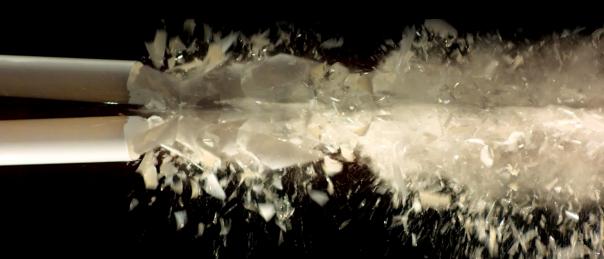
A takeaway owner was recently fined £2000 plus £450 costs, after a customer found shards of a broken light bulb in his kebab. Investigating officers from the London Borough of Enfield’s environmental health team discovered that a light bulb had accidentally broken whilst being changed and glass fragments had fallen into dishes in a hot display cabinet.
On a much larger scale, a global fast food burger brand was on the receiving end of a broken lamp scare, causing a huge logistical nightmare and the temporary closure of 50 outlets. When a broken light bulb was noticed on the floor next to the production line that made its burger buns, senior management made the decision to recall all buns from its restaurants which could have been contaminated. The store closures occurred at peak trading hours on a Friday evening, resulting in a loss of revenue and dissatisfied customers.
These unfortunate incidents are just two examples of many that can easily be avoided by the use of fragment retention lamps both within the dining areas and the actual food and drink preparation areas of cafés, coffee shops and sandwich outlets. Even where diffuser covers are fitted, a mishandling accident when a light bulb or fluorescent tube is being replaced, can result in thousands of glass particles being spread over a wide area, as anyone who has been unlucky enough to experience the shattering of an overhead lamp, will testify.
Owners and managers of “lunch on the go” outlets may not be aware of the dangers, but they should be, as the potential for compensation payments is huge. With today’s blame and shame culture, and the widespread use of social media; the public is quick to alert anyone, including local councils, of such incidents. Environmental health officers take such occurrences very seriously indeed, highlighting the importance of ensuring that appropriate measures are taken in order to minimise risk.
Having received just one complaint from a customer, a local councillor was reported as saying: “We will not allow businesses to play Russian roulette with the safety of customers.”
Such action may result not only in hefty fines and considerable court costs, but also store closures, potential loss of revenue and costly production wastage.
Fragment retention lamps, such as GlassGuard BlackBand are standard glass lamps with a technologically advanced coating applied to the outside surface. In the event of accidental breakage, such as frequently happens when they are being changed, this coating will retain the glass particles and phosphor powders, preventing wide spread contamination and ensuring optimum protection.
Whether a single food outlet, or part of a larger chain, the risks of glass contamination are identical. With a little forethought and advanced planning, the installation of fragment retention lamps can make the difference between a customer biting happily into their sandwich, and a sandwich that bites back with disastrous and ultimately costly consequences.
Find out more about GlassGuard at www.glassguard.co.uk.